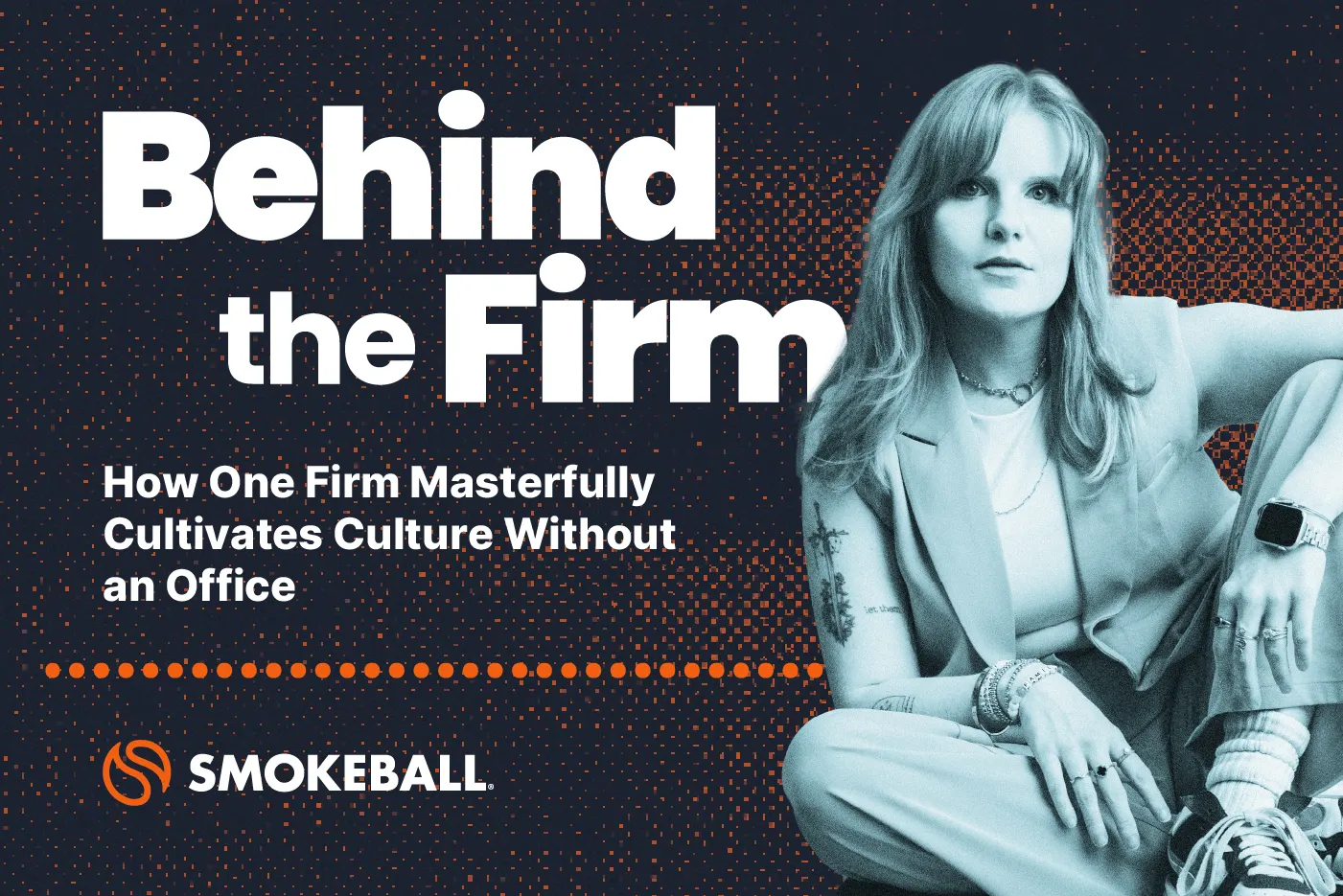Behind the Firm: Remote Revolution
Written by
|
June 10, 2025
Written by Smokeball
|
June 10, 2025

Written by Jordan Turk
|
June 10, 2025

When I sat down to meet with Ashlyn Lindskog, Attorney and Founder of AB Legal, she was poolside—laptop open, admin assistant beside her, both knocking out the day’s tasks in the morning sun. What was the occasion? Nothing. It’s just how they work. And make no mistake, they work!
This article is part of a series of real stories by real law firms. With Ashlyn, we’re diving into what it takes to make remote work actually work and how firm’s can lean into the flexibility.
Ashlyn didn’t set out to run a remote law firm. In fact, she was one of the first to go back to the office after the upheaval of 2020. But after a shifting perspective on work, and a desire to build something truly intentional, she’s moved all in on the remote workplace approach. In fact, studies show 91% of employees worldwide share Ashlyn’s sentiment.
But in a traditional industry, where client and staff relationships are essential, how do you keep your firm thriving without an office space? Ashlyn credits communication, intentionality, and transparency.

The Workplace Pivot
Ashlyn’s first experience with remote work was with the rest of the world during the pandemic in 2020. Abrupt and unplanned. With two young kids schooling remotely at home, it was increasingly difficult for her to balance work and home life. She was craving a space to separate the two roles.
When her office reopened, she was one of the first to go back. “At that point, I needed the physical separation,” she admitted. But as the office came back to life, she noticed something interesting: “Even back in the office, people were still relying heavily on Slack and Zoom. Those (legal) technologies really changed how we communicated.”
When she left her role as a partner at a larger firm to start her own practice, Ashlyn carried the lesson forward. If this is how the team is communicating, why not empower her to work where she's most effective, prioritizing outcomes and culture over a physical office?
Building a Team Without Borders
When Ashlyn launched her legal firm, she prioritized cost efficiency and strategic investments for maximum ROI. Ashlyn’s first hire was a remote legal assistant. “We started really small, just the two of us,” she said. “We communicated all the time and built a great working relationship.”
“What I learned early on is that not having an office doesn’t mean you can’t build culture.”
Instead of contracting a new office space, she invested in contract attorneys through platforms like LawClerk, eventually building a team of talented legal professionals across the country.
As Ashlyn’s firm and team grew, she wasn’t naive about the importance of building a culture that resonates for her employees and her clients. From the beginning, she knew that if remote work was going to succeed for her firm, it had to be designed with clarity. What this meant for Ashlyn’s thriving firm: she needed to be intentional about what her expectations were to her team from the get-go.
Culture Isn't Accidental; It's Essential.
Ashlyn doesn’t view a thriving culture at a firm as a given. She knows it takes specific focus and purpose to build a culture that fosters engagement, growth, and success. In her view, companies are mandating office returns to recreate a culture that, realistically, was already struggling.
It’s hard to build a culture at a law firm when everyone is in the same room, even. So it’s just about being intentional about how you create it.
When asked what makes her remote team effective, Ashlyn doesn’t hesitate. “You have to be very clear about your expectations,” she said. “You can’t just hope communication will happen—you have to design it (and foster it along the way).”
Having the right structure for your team is a critical component. The firm relies on Slack as the primary communication tool, and those expectations are clearly laid out during onboarding. “I’m upfront,” she explained. “If you need me, don’t email. I’m bad at email. Slack me or go through my admin.”
Having this tool and rule in place isn't solely about Ashlyn's accessibility, but rather about making sure the whole team is in sync. If a question is asked in Slack, it opens it up so that others in the firm can respond if they have the answer, or something to offer. This approach helps them be more efficient and it also creates open dialogue between the team at all times.
Culture isn't an add-on for Ashlyn; it's a non-negotiable core value that defines her firm. One example? Her “voluntold KPI.”
Team members are expected to participate and engage in the culture the firm has built, and it’s part of her 30- day and yearly team reviews. To Ashlyn, it's crucial that everyone feels empowered to ask questions and contribute answers, creating a unified team dynamic no matter their physical distance.
“The voluntold KPI is part of the performance review,” she said. “Engaging with your team, contributing to the culture—that’s not optional in a remote environment. If we’re not in the office together, we need to be intentional about connecting.”
She keeps it lighthearted and human based, so that the team is getting to know one another beyond their work tasks: one week might be a Slack thread on everyone’s “walk-up song,” another might be a small challenge. Participation is expected. “If someone doesn’t respond? I’ll follow up with a ‘heeeey,’” she laughed.
“You can’t build a culture in silos. Law firms don’t work like that. Businesses don’t work like that.”
Hire the human, not the resume
Ashlyn’s hiring process emphasizes not just skill, but alignment. “We’re really clear from the start about how we communicate. If our style doesn’t work for someone, that’s fine, there’s no judgment. But to join our firm, it has to be a fit.”
Before hiring a new employee, she identified the culture she wanted to foster and how she wanted her team to feel. And it paid off. If someone feels undervalued or wants to talk compensation, they come to her first, the result of a healthy culture and communication practice in a workplace.
“We talk a lot about how skill sets are very important,” Ashlyn says, “but comfortability and trust across your team is what really makes things click.”
Purposeful Meet-Ups
While the firm is fully remote, Ashlyn absolutely sees the value in face-to-face connection, but with a specific twist.
This year, she brought the team together for a day that included a photoshoot, lunch, and do some plant shopping. This wasn’t a work-focused, corporate retreat. Rather, it was a people-first gathering to engage in person, to make real connections and foster comradery. “Next time, I want to bring partners and families,” she shared.
For her, it’s about creating space for deeper and more comfortable interaction. “I don’t think you can have a successful team, remote or in-office, if you don’t take everyone away from their day-to-day lives to experience social interaction and strategy building in a place separate from where they work.”
These casual settings allow the team to get their brains out of the work box and ask questions like: What do we need? What’s working? What’s not? Those conversations don’t happen between meetings and emails.
Advice for Firms on the Fence About Remote Work
Ashlyn knows many firms are still hesitant on the remote work environment, but her advice and perspective on the matter is clear:
- Track the work, not the location: “What we do is trackable,” she states. “If someone’s billing their hours and the work is getting done, does it matter where they are?”
- Expand your talent pool: Ashlyn’s team lives across many states. Without having a remote structure in place, she would never have found the amazing talent that she has. Offering remote positions gives firms the ability to find the best person for the job.
- Legal Technology is everything: Plainly, she warns remote or hybrid teams to not skimp on IT services. Having the right tech stack keeps everything running smoothly.
- Get comfortable with a changing landscape: In today’s world, remote work is a benefit many employees are looking for in an employer. Ashlyn believes that a failure to acknowledge that need is a detriment to a firm, their clients, and practice. “Your opportunity for retention and recruitment will eventually completely bottom out,” she shares.
For Ashlyn and AB Legal, the remote workplace has been a massive benefit to the firm. Her thoughts for firms? “It’s not that hard, and frankly…it’s much cheaper.” She notes that her clients don’t care that she doesn’t have an office. When she meets them at a remote working location, they’re pleased that she gets the work done fast, efficiently, and is less expensive due to not having the overhead of rent.
Ashlyn created an environment where success isn’t measured by proximity, but by support, clarity, and connection. And her team agrees.
Learn more about Smokeball document management for law firms:
Book Your Free Demo
Ready to see how Smokeball client intake software helps you Run Your Best Firm? Schedule your free demo!















